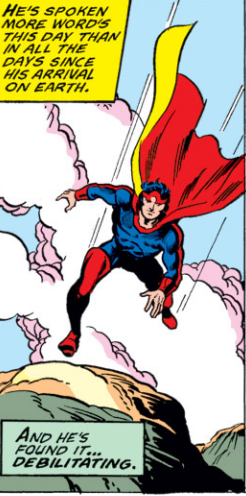Too Young to Die
It is fitting that Issue 10, the last one in the series, starts with John Nedley’s funeral. John, we recall, was a smart, fat boy with dreams of becoming a writer. Complications from his injuries at the hands of the school bullies led to his demise. He was pure potential, all of it now squandered.
Omega the Unknown had seven issues after the fight with Electro, though only five were written by the book’s creators. The story was never really resolved, so it is difficult to say where it was going, though we knew where its protagonists were headed: the mountains of Pennsylvania for James-i and Dian, who had just discovered another set of robot parents in the Starling master bedroom’s closet; and Las Vegas for Omega and Gramps, where the mystery man is shot dead by police. Though the last page announced the story would be concluded in an upcoming issue of The Defenders, Gerber and Skrenes left Marvel, and the eventual story written by Steven Grant cannot be considered the implementation of the co-authors’ plans. Gerber died in 2008, and Skrenes is sticking to their pledge never to reveal what was supposed to happen in the end. Enigmas the First through Third remain enigmas.
While the resolution of the book’s plot remains unknown and unknowable, reading issues 4-10 (skipping seven and eight) reveals the general direction in which the main characters were heading as individual subjects as they navigate a hostile environment. Both James-Michael and Omega were making only partly successful attempts at being a self among selves. James-Michael is miserable in school, but he does make friends there, and continues his strong connection with Amber. When John is attacked in issue 10, the narrator tells us that James-Michael feels “some non-physical, unidentifiable pain. / He’d begun to like John Nedley.” When Richard Rory judges a violent new character harshly, James-Michael speaks with the wisdom of the local, in a role usually reserved for Amber: “I think you may be judging your friend too harshly, Mr. Rory….an’ too hastily./ You’re...new to Hell’s Kitchen.”
Omega’s transformation is more dramatic. Issue 4 starts with him contemplating the 59th Street Bridge as a woman hurled herself off it, marveling that “something” keeps “compelling him to get involved!” He is also obliged to admit that, on Earth, he is never bored, and that the locals “emotionality” is “a source of fascination.” Moreover, “he has noticed in himself the inchoate stirring of unfamiliar feelings which, he presumes, must approximate emotion.” Upon rescuing the woman, he even says his first word: “Why?”
From this point on, Omega will continue to speak occasionally; by issue 10, when he and Gramps have embarked on their “errand of mercy” (to win enough gambling money to take James-Michael out of Hell’s Kitchen), he is, for him, almost chatty:
“He’s spoken more words this day than in all the days since his arrival on earth.
And he’s found it…debilitating. “
He retreats to the desert, but cannot stop thinking about the problem of communication: “How, he wonders, can these earthmen bear to spend so much time in the company of their fellows? It’s as if they equate solitude with loneliness? The sudden attack by a monster is the pretext for the most bizarre Omega monologue of all, the one that floats so freely from Omega’s point of view as to include the approbation, “You cad!” His solitude has been spoiled, and he returns to Vegas. The fact that he is once again attacked, and even apparently shot dead by the police on the very last page, shows the desert scene to be, if not prophetic, then at least emblematic of both his and James-Michael’s plight. How can they balance a growing impulse towards connection and their fundamental need for isolation? Is there a way to exist and grow in a world of irrational, aggravating, but occasionally intriguing people while still maintaining the integrity of one’s conscious self? Not for nothing does James-Michael’s apparent psychic ability manifest itself in the onslaught of external “voices.” Living among others is, in Omega the Unknown, an invitation to assault. Certainly, it has its rewards, but the book never got the chance to let its heroes reap the benefits. Cancellation was not just inevitable; it was thematically consistent with the plight of the comic’s own heroes.

